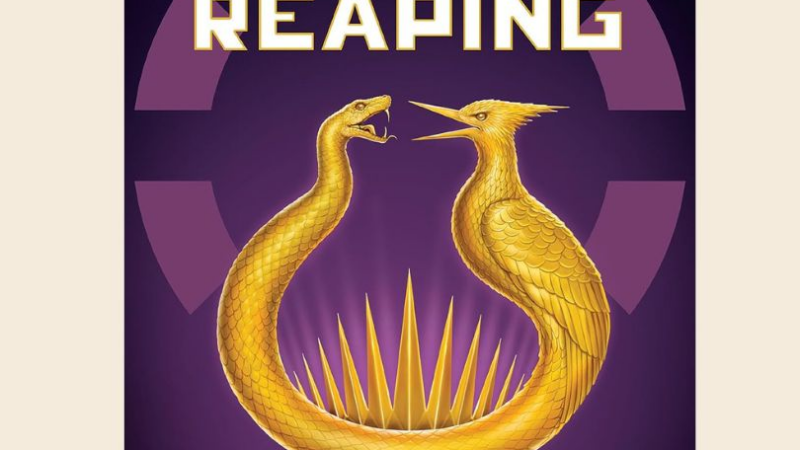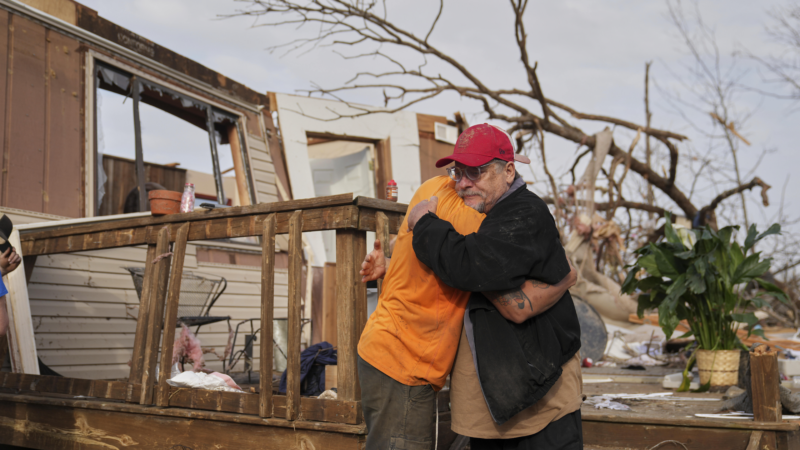They made a post-apocalyptic Sundance film. Then their homes burned
Just hours before the Eaton Fire barreled through Altadena earlier this month, filmmaker Meera Menon and her husband, Paul Gleason, were in Eaton Canyon playing with their 3-year-old.
“We have all these pictures on our camera roll of her, just playing with leaves in the wind,” Menon says.
Later, when they saw the flames, they grabbed their hard drives and left behind their dream home, a mid-century ranch house.
It burned down in the fires.
Menon and Gleason were just weeks away from premiering their indie film, a low-budget zombie thriller called Didn’t Die, at Sundance.
In the movie, as the “biters” roam the post-apocalyptic land, the main character – played by Kiran Deol – tries to connect to anyone still out there who might be listening to her podcast.
“We made this movie literally in our home,” says Menon.
The house appears in the movie in flashbacks, “as a memory these people had in happier times before the apocalypse started, before the world ended. Suddenly it’s like holding a mirror up to something that we’ve only begun to process.”
A community effort
Menon, who has worked on episodes of Fear The Walking Dead, Westworld and Ms. Marvel, directed the film and co-wrote it with Gleason, who shot the movie. They financed it themselves and cast it with their dog, their friends, and family. Their daughter, Lakshmi, even appears as a baby.

Menon’s longtime friend Erica Fishman produced the film, and her husband Geoff Boothby edited it. They also lost the Altadena home they lived in with their 3-year-old daughter.
Now, Fishman and Menon are mourning their homes and the mountainside community, which they described as a magical place with wild peacocks roaming the streets.
“This community, Altadena, was the place we wanted to spend the rest of our lives,” says Menon. “There’s no overstating how special and unique and what a true sense of home this place really gave us.”
Prescient messages about loss
Menon sees the irony and symbolism of their post-apocalyptic film, which she began working on during the COVID-19 pandemic. “The movie was born from this place of feeling [that] the world was radically destabilized in 2020 with COVID, and just how the world stopped,” she says. “Production stopped. It was devastating for an entire economy of working people. Since then, it just feels like it just is one thing after another. “

After COVID, TV and film production paused again during the Hollywood writers and actors strikes. Menon and Fishman say they’ve held on as other changes upended the industry. The fires are the latest and most personal catastrophe they’ve endured while making their film.
“We are just kind of spinning, trying to understand how our film became this sort of prophesy for what we’re going through,” says Menon.
“The movie’s about — when the world falls apart, what’s better: being alone or being around people? Do you need community or do you just need yourself?” Fishman says.
At Sundance, they won’t be the filmmakers who lost everything in the fires. So did Isaiah Saxon, who wrote and directed the film The Legend of Ochi, which is also premiering at Sundance and will be released in February; Amy Scholder, who produced the Sundance documentary Heightened Scrutiny, lost her home, too, as did Michelle Satter, founding director of the Sundance Institute’s Feature Film Program.
Still, Menon and Fishman say they look forward to introducing their film to festival goers.
“It just feels like we have to go,” says Menon.
“We made this movie with people that are some of our closest friends in our community,” Fishman adds. “We’ve created this plan to celebrate this thing that we built together. And it feels essential and comforting that we are able to do that still.”
Didn’t Die is set to premiere Tuesday night, almost exactly three weeks to the hour after the filmmakers picked up and left their homes behind.
New ‘Hunger Games’ prequel reminds that sometimes past truths aren’t visible
Sunrise on the Reaping recounts the 50th annual Hunger Games, telling the story of Haymitch Abernathy. It's themes and events conjure images of today's U.S. political climate.
At 83, Martha Stewart celebrates gardening with her 101st book
Martha Stewart talks gardening, wanting to be "one of the girls" and her 101st book with NPR Morning Edition host Michel Martin.
This is why Canada has plenty of eggs — and the U.S. doesn’t
While the U.S. grapples with an egg shortage caused by avian flu, eggs remain plentiful and affordable in Canada. There are reasons for that, including that egg farms there tend to be smaller.
In the Missouri Ozarks, residents struggle to rebuild after tornadoes
Twisters that tore through Union County, Missouri killed 6 people. One couple survived against incomprehensible odds in a trailer obliterated by the storm.
‘Segregated facilities’ are no longer explicitly banned in federal contracts
The Trump administration cut a clause from federal contracting rules that had been on the books since the 1960s: Companies are no longer explicitly prohibited from having segregated facilities.
Trump says he’s ending Secret Service protection for Biden’s adult children
President Trump said he was ending "immediately" the Secret Service protection details assigned to Democrat Joe Biden's adult children.







